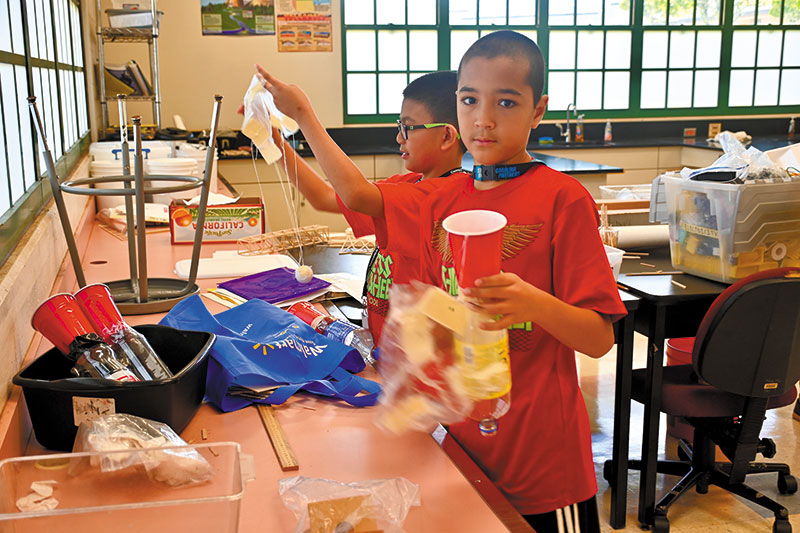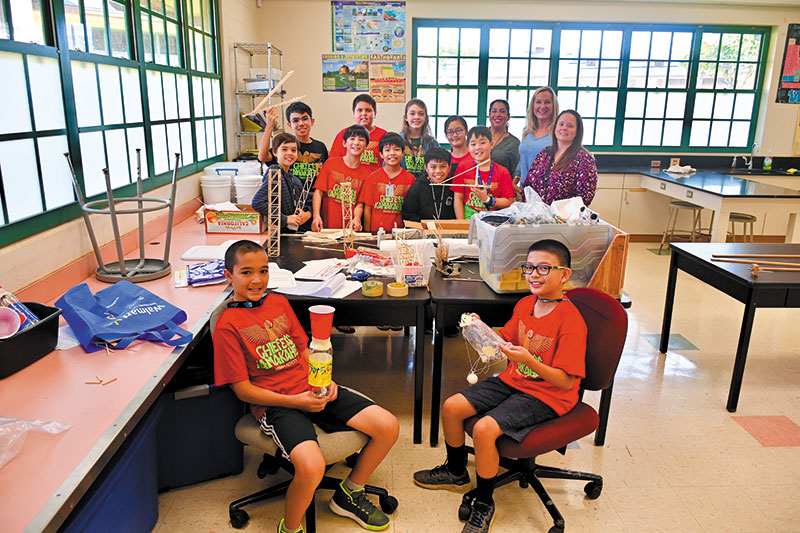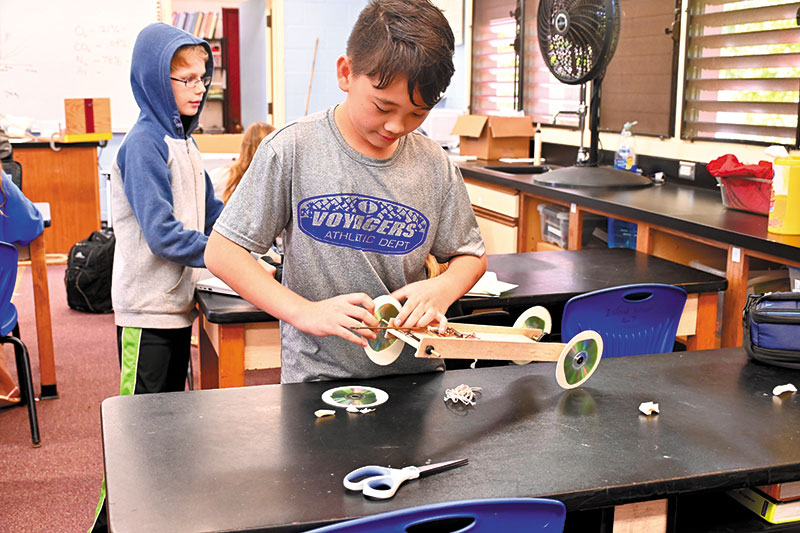Down To A Science
With the 20th annual Kaua‘i Regional Science Olympiad coming up Jan. 18, keiki from across the Garden Isle are once again ready to put their skills to the test.
Island School had quite an impressive 2019. Last year, science teacher Joe Corbo was named Coach of the Year, and his team won the coveted state tourney Spirit Award. Yet, for these middle-schoolers and their leader, there were no hoops or cleats involved, no basketball courts or football fields.
Rather, they battled it out over genetics, engineering and meteorology, and will do so again at the 20th annual Kaua‘i Regional Science Olympiad, slated for Jan. 18 at Kaua‘i Community College.
This year, Island School will be sending two middle school teams of 10 students each to compete against groups from Chiefess Kamakahelei Middle School and St. Catherine School. In the high school division, meanwhile, the Voyagers (under the leadership of science teacher John Patterson) will be competing against a team from Kaua‘i High School.
Corbo, a sixth-grade teacher, has led Island School Olympiad teams for the past eight years, and under his tutelage the school has finished first every year except in 2013, when it placed second. Following the regional tourney, Corbo’s teams have gone to place as high as third at states.
“What Mr. Corbo has been able to accomplish through Science Olympiad has molded a group of students to work toward a shared goal with teamwork that encourages positive and high expectations through peer learning,” says Island School headmaster Shannon Graves. “Because of past success and the positive relationships Mr. Corbo has with middle school students, we have built a competitive team that wants to carry on the tradition and is excited about science and learning.”
To say the Voyagers are a local juggernaut is an understatement, and Corbo approaches the tournament with all the fiery competitiveness of any seasoned coach.
“Over the years, we have created a culture that cares about winning, although it is not our primary focus,” he says. “The focus is about learning from our failures. Our students have had success when they are highly motivated, work well with others, follow their interests, build upon their strengths, improve upon their weaknesses and have fun.”
On a crisp Tuesday afternoon, Corbo and his team are hunkered down in the school’s science building. Ninth-grader Annika Evanoff is the veteran on the team, having competed since sixth grade. This year, she is working on heredity and water quality.
“I’ve learned a lot that has helped me in my honors biology class,” explains the future geneticist. “I find it really interesting how DNA can affect things in the future.”

Chiefess Kamakahelei Middle School students Broc Candido and John Ray Salud experiment with different pingpong parachute packing methods.
Meanwhile, sixth-grader and Island School newcomer Marshall Agena has been putting in long hours in his grandparents’ garage, building his soon-to-be-revealed competition prototype.
“Their success depends on how much time they put in,” explains Corbo. “Most of the real work is done at home on their own time, not just during practice.”
Just a couple of miles down the road from Island School, the team at Chiefess Kamakahelei Middle is also hard at work testing its designs under the leadership of sixth-grade science teacher Erin Finlay.
“Two years ago was the first time that I coached Science Olympiad, and our team did exceptionally well,” she says. “We ended up with two teams (of 15 students each) for regional competition, and we proceeded to the state championship on O‘ahu, as well.”
This year, the school has a team of 17 students, mostly all sixth-graders, but only 15 will be participating due to Science Olympiad rules.
“I love seeing the growth in their learning,” says Finlay, “watching students jerry-rig their tower or car after it ‘fails’ to do its task, and finding a better solution to adjust, is a wonderful sound and sight. The conversations between teams is very inspiring as a teacher because you can observe their growth.
“There are no kits we used,” she continues. “These students are pulling ‘free’ resources from wherever they can find, even if it means taking apart an alarm clock because they need the gear to get their car to move better.”
For Finlay, the greatest challenge is not about designing and building. Rather, it’s about finding the funding to support the program. At Chiefess, Science Olympiad is run as a club, and funds are limited. Two years ago, when her team made it to the state tournament, Finlay’s greatest concern was about how she was going to fundraise in order to get her 30 middle-schoolers to the event on O‘ahu.
While both of these schools may face very different challenges, the one common denominator is the passion, drive and intelligence of their students.
Ask either Agena at Island School or sixth-graders Keegan Ushio and David Braman at Chiefess what they love most about Science Olympiad, and all three boys will tell you it’s working together with the challenge of designing and building.
“What is great about Science Olympiad is that it not only recognizes individual achievements, but it also stresses the importance of doing well collectively as a team,” says Corbo. “We only qualify for the state or national tournament if our whole team does well.
“Students will go into competition with partners and use each other’s strengths to overcome challenges. Seeing students work together and learn from each other excites me. Sometimes students don’t perform as well as they would like, but they always seem to come away with a valuable learning experience.”
For more information, visit hsso.org.






